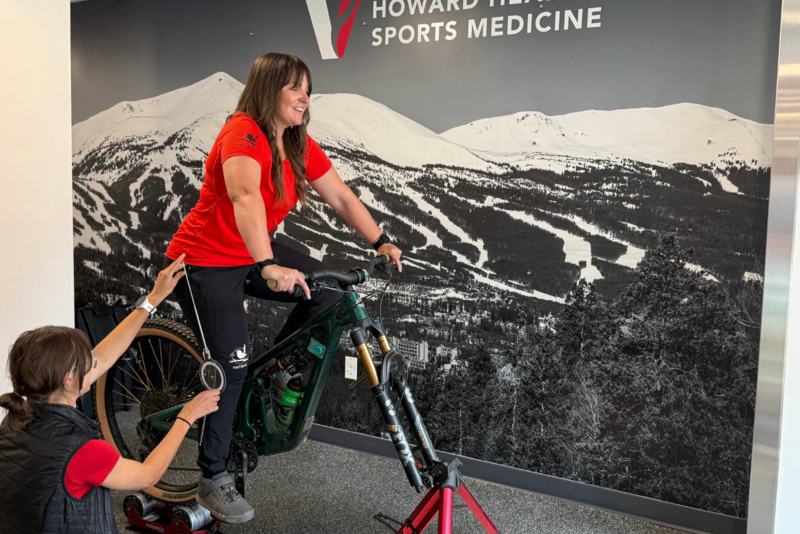News
Sleep tips for your health and performance
Abbey Lathrop & Taylor Heppner | Howard Head Performance
October 04, 2021

Making time for sleep as part of your daily routine can be difficult when trying to meet deadlines, making time for family, and juggling the daily obligations. Just like eating right and exercising, good sleep is critical for your physical and brain health. Getting consistent, good sleep helps improve:
- Weight management – Normal levels of ghrelin and leptin are produced to help your energy, appetite and hormones.
- Concentration and productivity – Do you have a big task to get done or a major problem to solve? Spending adequate time in the sleep stages will not only keep your focused and help you quickly move through that daunting task, but you can also solve those problems while you sleep!
- Memory – During deep sleep, your brain begins organizing and consolidating memories; REM sleep helps cement these memories
- Immune function – Persistent low-level inflammation throughout the body
- Growth and development – Deep sleep triggers the release of hormones that promote growth, specifically in adolescents
- Learning new skills – Are you training or trying to learn a new motor skill? Are you trying to understand a new language or simply need to memorize more information for a test? Practicing two hours before bed followed by a deep sleep can help you master a new skill more quickly!
- Health – Prevents early onsets of heart disease, Alzheimer's, dementia, diabetes, and more
- Mood – Helps you get along better with people
How much sleep should I get per night?
7-9 hours per night is the recommendation. Babies, young children and teens need more sleep than adults for their developing brain and growing body.
How do I know if I am getting good sleep?
You should fall asleep rather easily and wake-up feeling rested and refreshed, rather than groggy and tired. Try to avoid sleeping pills, as they don’t give you the deep sleep you need.
What happens if I don’t get good sleep for one day? A few days? One week? Consistently?
Everyone has bad nights of sleep, but it does add stress to your systems. The next day you will have a harder time focusing on, and performing, your daily tasks. You can recover quickly from one night of bad sleep. One week or consistent bad sleep can lead to moodiness, lack of concentration and memory, fatigue, and other health issues that can become quite difficult to recover from.
Studies have found that poor sleep can lead to an early onset of dementia, clinical Alzheimer's disease and even death. Researchers found that better sleep not only reduces the likelihood of developing clinical Alzheimer’s disease, but it also reduces the development of tangle pathology in the brain — another substance that accumulates in Alzheimer’s disease. Unfortunately, lack of quality sleep can also lead to several other health issues including heart disease, diabetes, obesity, and more.
I keep tossing and turning, or I wake up in the middle of the night. How can I fall back to sleep?
Refer to the tips below to improve sleep and either add them into your routine (if this is a regular thing), or try to get up and change your focus for a bit!
What are some tips to get good sleep? What can I do as I get ready for bed?
Here are eight tips for improving the quality of your sleep:
- Lower the temperature in your sleeping space. Between 65-72°F is ideal! Did you know that the first thing your body spends energy on when you are falling asleep is lowering your core body temperature? Help yourself out by lowering the temperature in-room/house!
- If you get into bed and have trouble falling asleep — get out of bed! Do not stay lying down fighting to fall asleep. Get up to do small, simple tasks close to bed. Maybe you fold laundry, pick-up some clutter, meditate, etc. This will help your body realize that it is tired and help you get back to bed.
- Skip the night cap. A lot of people go for an extra glass of wine or drink before bed to help them fall asleep. The truth is that while you might fall asleep faster, you will not get better quality sleep. Alcohol consumption can inhibit your ability to stay asleep and decrease the total time of deep sleep you need.
- Cut out the afternoon caffeine jolt. It might help in the short term but when it comes to bedtime you do not want to have left over caffeine in your system! Did you know that caffeine has a half-life of 5-7 hours in most people? If you drink a cup of coffee at 3pm, by 8-10pm you will still have half of that caffeine in your system!
- Stick to a schedule. The more you can wake up and fall asleep at a consistent time, the better your body will adjust and be able to maximize the amount of deep sleep you get in a night! This will leave you feeling more rested, waking up ready to tackle the day & improve your overall sleep efficacy! (Stick to that schedule on the weekends too! It can be tricky but it's worth it! You've got this!)
- Grab a high protein snack before bed. This can be most helpful if you struggle falling asleep, you wake-up shortly after falling asleep, or if you wake-up very hungry in the mornings. A high protein snack will give your body something to work on and break down to help you fall asleep. It will also aid in recovery once you are asleep and have you waking up ready to go!
- Take a cooler shower. This will help your body get to a core temperature that is ideal for sleeping & recovery throughout the night (look back at tip #1).
- Black out your space! Rid your sleeping space of any small lights on alarms, outlets, chargers, etc. Also, get rid of anything that is not a light and consistent sound (sound machines and fans can help drown out surrounding sounds you can't get rid of). TRICK: If you hold your arm out straight and can still see your hand - there is too much light in your room!
If you would like to consult with a Vail Health Howard Head Performance specialist, please click here and schedule an appointment.
Sources:
- Walker, M. (2017). Why we sleep: Unlocking the power of sleep and dreams. Simon and Schuster.
- Harvard Health Publishing: Sleep well — and reduce your risk of dementia and death
More News
-
More

Eagle physical therapist joins the U.S. Air Force’s 9G club
Eagle resident Devyn Kammert, a physical therapist with Howard Head Sports Medicine,
-
More

Optimize Your Ride: What Is a Medical Bike Fit and Why It Matters
Whether you're a weekend warrior, daily commuter or competitive cyclist, comfort and performance on your bike are...
-
More

Travel Tips to Combat Soreness & Fatigue
While some chase the snow, others are heading to the beach for warmer weather. Travel is a common passion of those...





